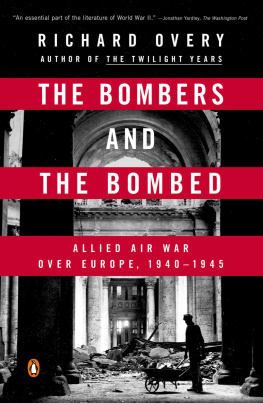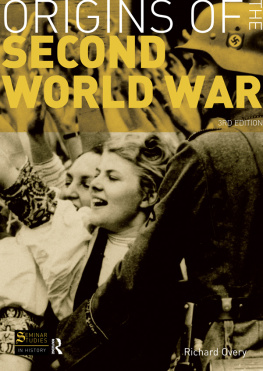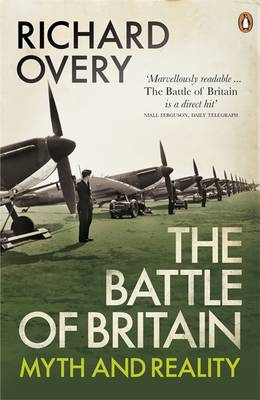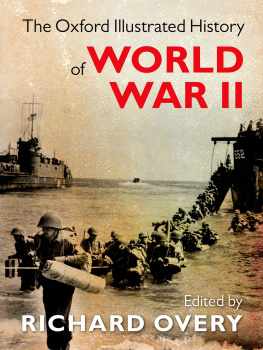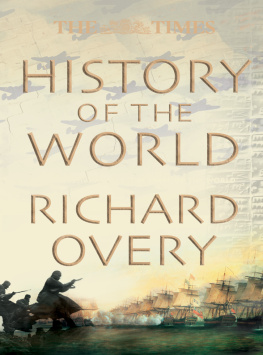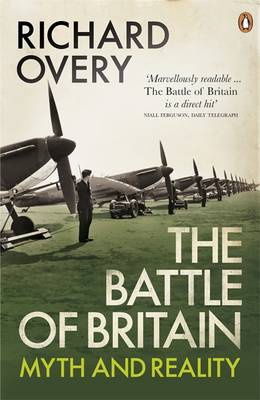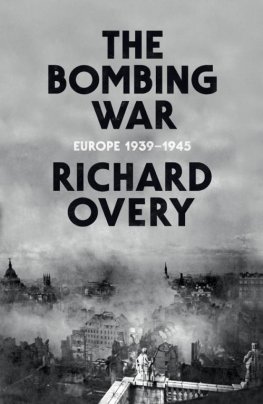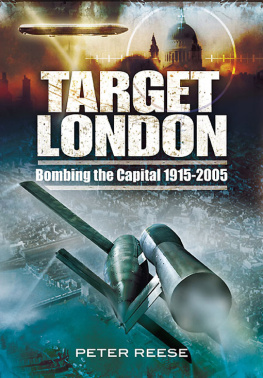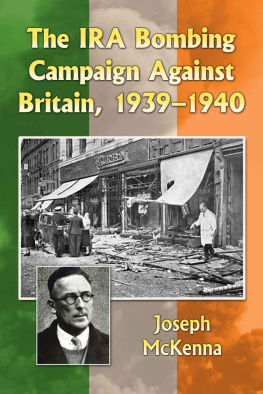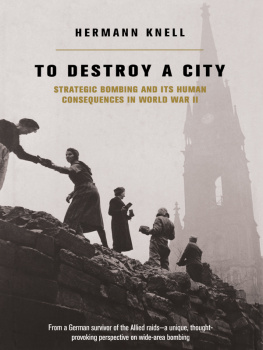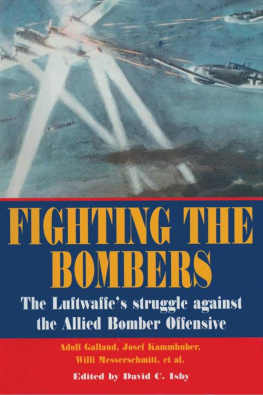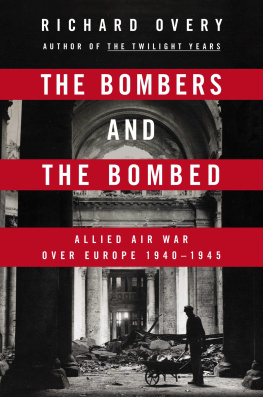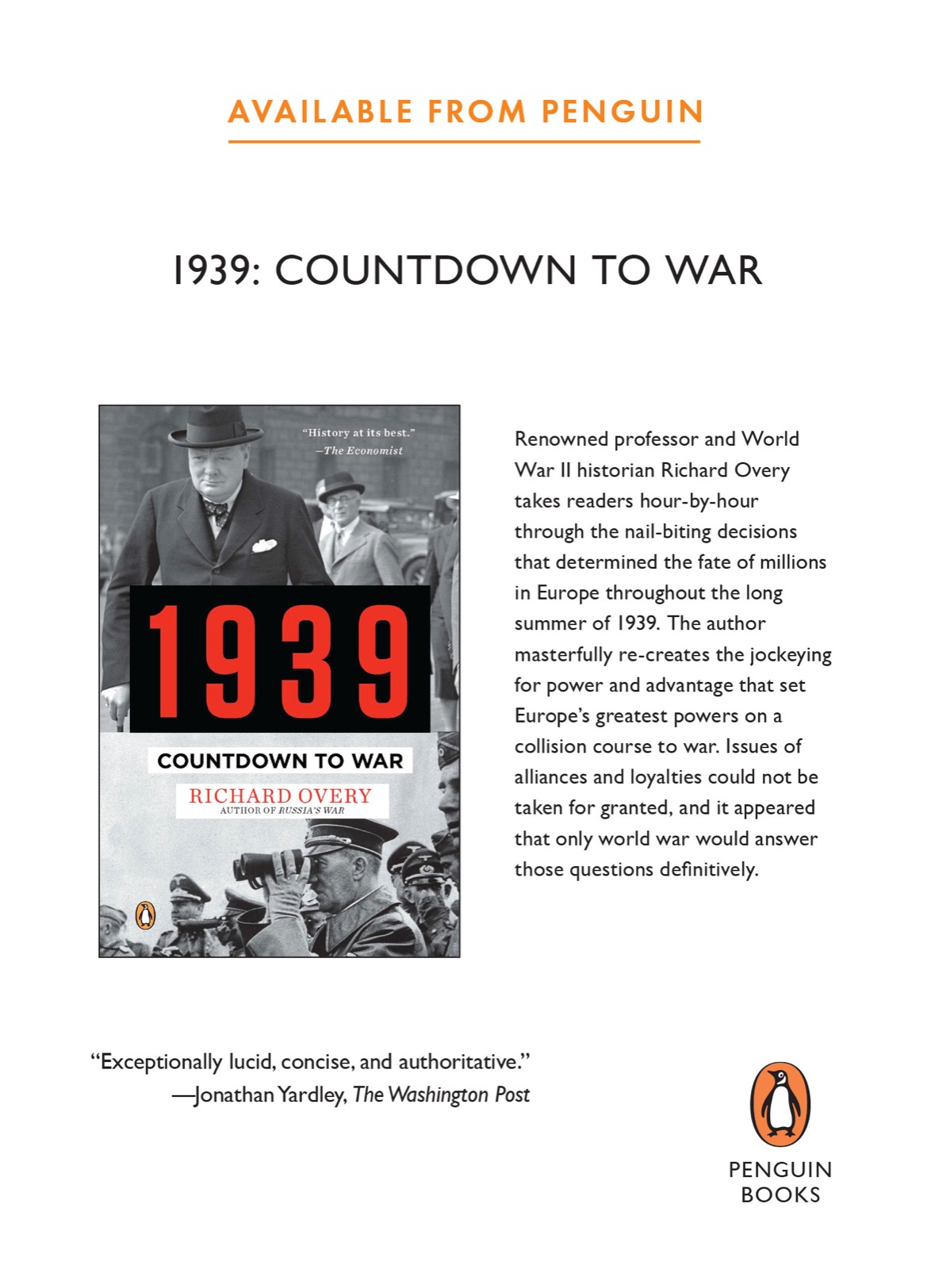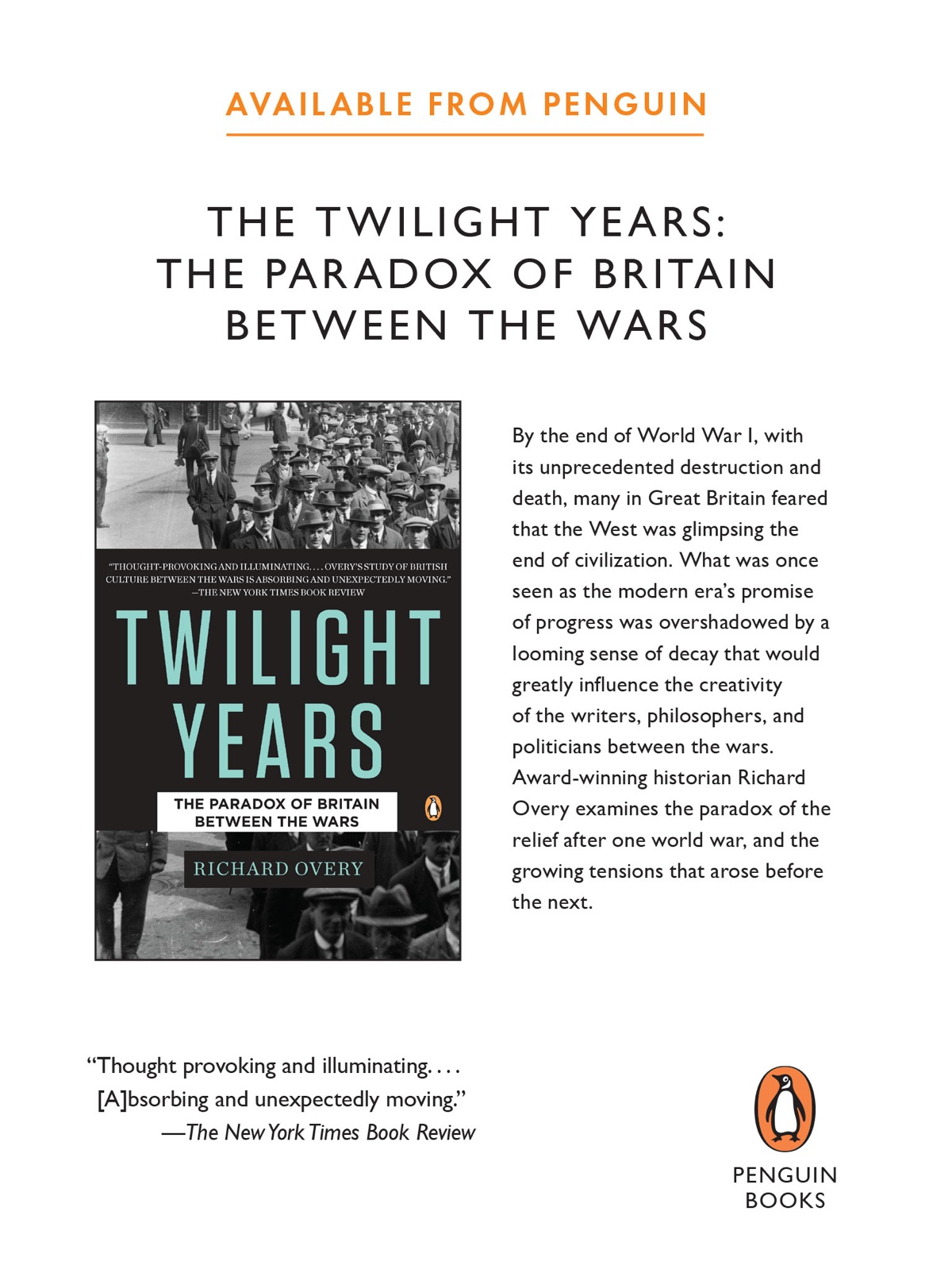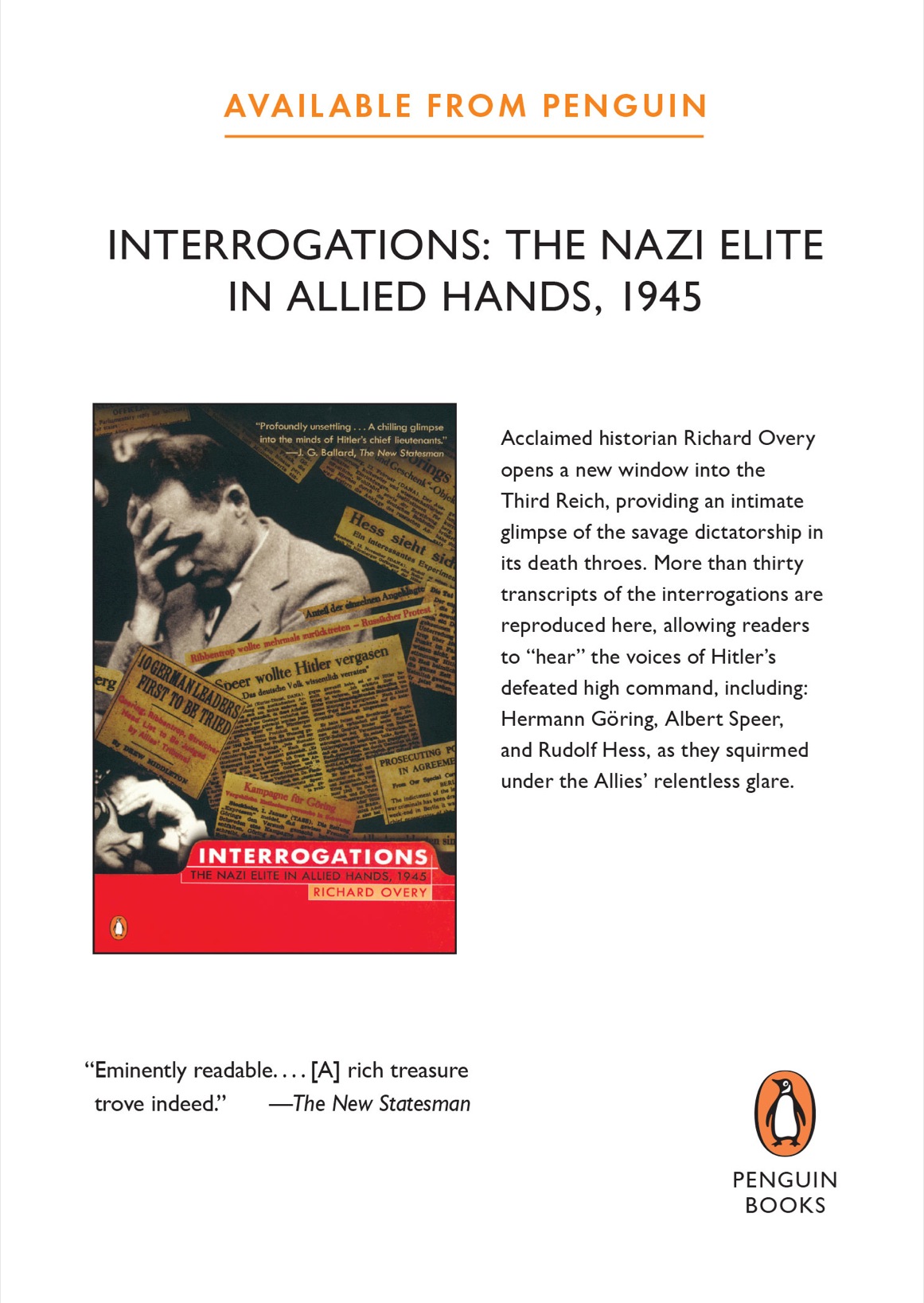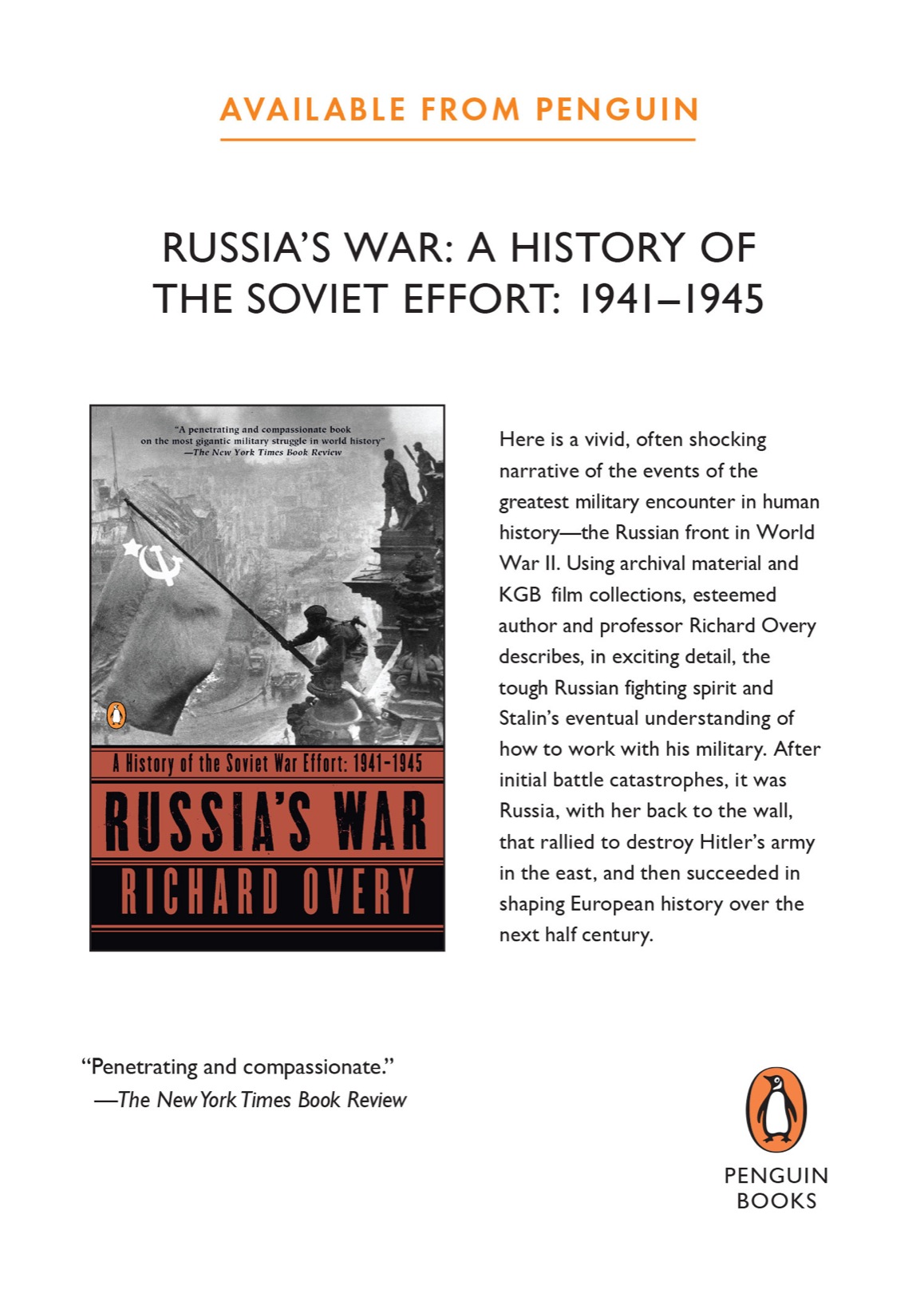PENGUIN BOOKS
THE BOMBERS AND THE BOMBED
Richard Overy is a professor at the University of Exeter, UK. A leading expert in World War II history, he has written and edited more than thirty books, including Why the Allies Won, Russias War, and The Twilight Years. In 2001 he was awarded the Samuel Eliot Morison Prize of the Society for Military History. In 2010 he won the Doolittle Award from MIT for his lifetime contribution to aviation history. He is a fellow of the British Academy and a member of the European Academy of Sciences and Arts.
Praise for Richard Overys The Bombers and the Bombed
There will be debate over the bombing campaign in Europe for years to come.... In the future, though, that debate will have to take into account the facts and the arguments marshaled by Overy in The Bombers and the Bombed, which immediately becomes an essential part of the literature of World War II. The conclusions it reaches about strategic bombing will have to be reckoned with by any nation that takes it upon itself to bomb another into submission, if not oblivion, and anyone who takes those conclusions seriously will be hard-pressed to argue the efficacy of that strategy.
Jonathan Yardley, The Washington Post
Magnificent... The Bombers and the Bombed is exhaustively researched, well written, and definitive. This welcome volume will be of interest to any reader who wants a detailed overview of the Allied bombing campaign.
The Christian Science Monitor
Painstakingly researched and clearly written, this excellent book will interest both experts and readers seeking an introduction to its analytically and morally complex subject.
The Cleveland Plain Dealer
First comprehensive analysis of the Allied strategic bombing offensive in Europe.
Publishers Weekly
Overy delivers an insightful analysis of how all nations reversed their abhorrence of killing civilians when it became unavoidable. Overy provides an eye-opening and often distressing account.... For a far more expansive view that includes those on the receiving end [of the bombing], Overy is the choice.
Kirkus Reviews
Superb... Overy has presented a very strong case in support of his view.
Booklist
Magnificent... Must now be regarded as the standard work on the bombing war... It is probably the most important book published on the history of the Second World War this century.
The Guardian (London)
This tremendous book does what the war it describes signally failed to do. With a well-thought-out strategy and precision, it delivers maximum force on its objectives.... The result is a masterpiece of the historians art.
The Times (London)
It is unlikely that a work of this scale, scope, and merit will be surpassed.
Times Higher Education (London)
What distinguishes Mr. Overys account of the bombing war from lesser efforts is the wealth of narrative detail and analytical rigor that he brings to bear.
The Economist
Hard to surpass. If you want to know how bombing worked, what it did, and what it meant, this is the book to read.
The Times Literary Supplement (London)
PENGUIN BOOKS
Published by the Penguin Group
Penguin Group (USA) LLC
375 Hudson Street
New York, New York 10014

USA | Canada | UK | Ireland | Australia | New Zealand | India | South Africa | China
penguin.com
A Penguin Random House Company
First published in Great Britain as The Bombing War: Europe 19391945 by Allen Lane, an imprint of Penguin Books Ltd. 2013
First published in the United States of America by Viking Penguin, a member of Penguin Group (USA) LLC, 2014
Published in Penguin Books 2015
Copyright 2013 by Richard Overy
Penguin supports copyright. Copyright fuels creativity, encourages diverse voices, promotes free speech, and creates a vibrant culture. Thank you for buying an authorized edition of this book and for complying with copyright laws by not reproducing, scanning, or distributing any part of it in any form without permission. You are supporting writers and allowing Penguin to continue to publish books for every reader.
from Collected Poems by John Betjeman. Copyright 1955, 1958, 1962, 1964, 1968, 1970, 1979, 1981, 1982, 2001 the Estate of John Betjeman. Reprinted by permission of John Murray (Publishers).
Excerpts from Englands Hour by Vera Brittain. Reprinted by permission of Mark Bostridge and T. J. Brittain-Catlin, literary executors of the estate of Vera Brittain, 1970.
Illustrations are courtesy of the RAF Museum, Hendon (). I am grateful to all the archives involved for kind permission to reproduce these images.
THE LIBRARY OF CONGRESS HAS CATALOGED THE HARDCOVER EDITION AS FOLLOWS:
Overy, R. J.
The bombers and the bombed : Allied air war over Europe, 19401945 / Richard Overy.
pages cm
Includes bibliographical references and index.
ISBN 978-0-698-15138-3
1. World War, 19391945Aerial operations, Allied. 2. World War, 19391945EuropeAerial operations, Allied. 3. World War, 19391945Aerial operations, AlliedMoral and ethical aspects. 4. Bombing, AerialEuropeHistory20th century. 5. Bombing, AerialSocial aspectsEuropeHistory20th century. 6. Civil defenseSocial aspectsEuropeHistory20th century. 7. Bombing, AerialGermanyHistory20th century. 8. Bombing, AerialEurope Public opinion. 9. Public opinionEurope. 10. World War, 19391945Europe. I. Title. II. Title: Allied air war over Europe 19401945.
D785.O92 2013
940.544dc23
2013018405
Cover design: Jason Gabbert
Cover photograph: Berlin, East Germany, September 1, 1948, Popperfoto/Getty Images
Version_2
Oh bountiful Gods of the air! Oh Science and Progress!
You great big wonderful world! Oh what have you done?
John Betjeman, 1940
CONTENTS
PREFACE
Between 1939 and 1945 hundreds of European cities and hundreds more small townships and villages were subjected to aerial bombing. During the course of the conflict a staggering estimate of around 600,000 European civilians were killed by bomb attack and well over a million more were seriously injured, in some cases physically or mentally disabled for life. The landscape of much of Europe was temporarily transformed into a vision of ruin as complete as the dismal relics of the once triumphant Roman Empire. To anyone wandering through the devastated urban wastelands immediately after the end of the war, the most obvious question to ask was: How could this ever have been agreed to? Then a second thought: How would Europe ever recover?

